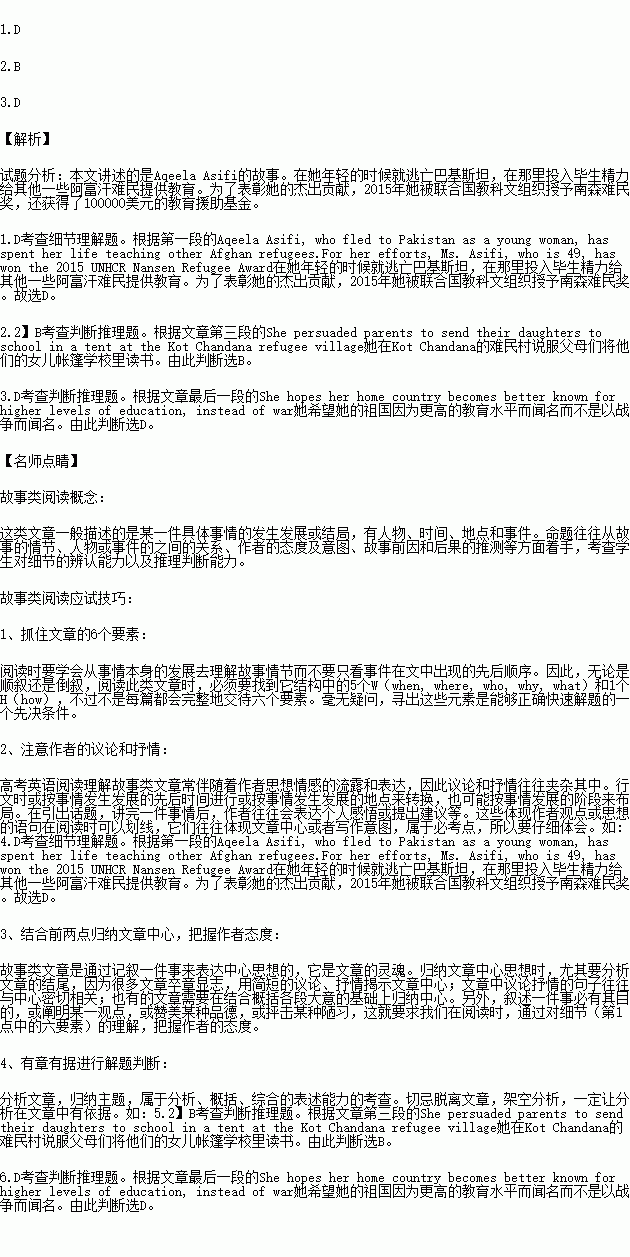题目内容
Aqeela Asifi, who fled to Pakistan as a young woman, has spent her life teaching other Afghan refugees.
For her efforts, Ms. Asifi, who is 49, has won the 2015 UNHCR Nansen Refugee Award. She also gets $100,000 to help pay for her education projects. The UNHCR Nansen Refugee Award honors extraordinary service to people who have been forced from their homes. Eleanor Roosevelt, Graca Machel and Luciano Pavarotti are some of the other winners of the award.
Asifi faced many problems in Afghanistan before she fled to Pakistan. Resources were limited and education for women was discouraged. However, in Pakistan, the 49-year-old was able to bring change to her conservative Afghan community. She persuaded parents to send their daughters to school in a tent at the Kot Chandana refugee village. The village was in the Punjab Province of Pakistan.
Since then, Ms. Asifi has guided more than a thousand refugee girls through their primary education. “When I began my mission to educate Afghan girls, I could not have imagined that one day it will win me this award. I cannot express my happiness,” she told VOA.
Ms. Asifi was a teacher in Kabul when she fled with her family in 1992. “In Afghanistan I was teaching both boys and girls,” she told VOA. “When I left Afghanistan and ended up in this refugee village with my family, I was saddened to find out there were no facilities here, particularly for women and girls.” They made their home in the distant refugee community in Kot Chandana. There she began teaching a small number of students in her tent. She made teaching materials by hand.
Her tent school has led to the opening of several permanent schools in the village. These schools teach more than one thousand children. Support from the UNHCR, local government, and non-governmental organizations helped make these new schools possible.
Ms. Asifi is a mother of six children. She has worked hard to pay for their education. She spends almost all her income to pay her son’s tuition to study engineering at Kabul University.
But seeking higher education for her four daughters is difficult. There is not enough money or secondary schools for girls in the village.
The Afghan teacher hopes more and more children will receive an education in Afghanistan. She hopes her home country becomes better known for higher levels of education, instead of war. “I want my goal to be introduced in parts of Afghanistan where conservative traditions and customs still prevent parents from sending their daughters to outdoor schools,” she said.
1.According to the passage, Asifi was able to win the 2015 UNHCR Nansen Refugee award mainly because________.
A. she suffered a lot more than other refugees who fled to Pakistan
B. she was the kindest person all over the world
C. she witnessed the cruelest event when she was in Afghanistan
D. she made great contributions to refugees despite leaving her homeland
2.Which of the following is TRUE about Asifi’s experiences?
A. Before she fled to Afghanistan, she had been a teacher in Pakistan.
B. Asifi succeeded in changing attitudes of Afghan refugees toward girl education.
C. Asifi determined to win the award when she began to educate Afghan girls.
D. All the materials needed for teaching were borrowed.
3.What can be inferred from the passage?
A. Resources were unlimited and education for women was encouraged before Asifi fled to Pakistan.
B. Eleanor Roosevelt, Graca Machel and Luciano Pavarotti all fled to other countries from Afghanistan.
C. Asifi’s daughters can enjoy equal opportunities like their brothers to receive higher education at university.
D. Asifi still treats her own country with great affection though living as a refugee in another country.
 通城学典默写能手系列答案
通城学典默写能手系列答案
